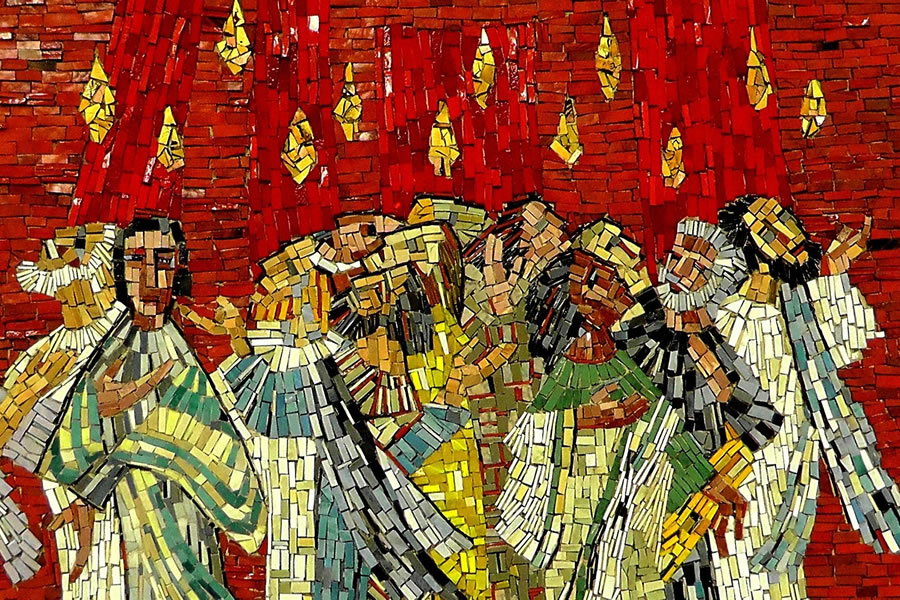Blog & Pastor Letters

The Church and Constant Renewal by the Holy Spirit
05-23-2021Weekly ReflectionRev. Victor C. YakubuI remember attending Mass in my community as a young man, with Latin as the main language. You can imagine my confusion singing in Latin while having a limited vocabulary of English as my fourth language. With three native languages in my head, I could hardly follow Latin, but the rhythm and rhymes amused me so much that I could easily mumble everything with the congregation. With some Latin, I felt I belonged to the Church just like the missionaries who promoted it. One Sunday, the Irish priest surprised everyone. He announced at Mass that the choir could sing in their native language and beat the drums. He began to preach to the people in their native language. The reforms he was bringing impressed me. The congregation was more impressed so much so that subsequent Sundays witnessed large crowds in the pews. The Catholics invited others because the renewal considered by the Irish priest recognized their language as part of the language of the Universal Church.
After four decades of this experience, I can still visualize the sharp contrast with the progressive changes in liturgy and worship up to the present age. One important aspect of the Church is that it is always constantly renewing itself. The celebration of Pentecost in the Church is a reminder of the constant renewal the Church faces in every culture and in every age.
The Second Vatican Council necessitated those changes the Irish missionary initiated into my community and the impact was monumental. The first reading says there were “devout Jews from every nation” who assembled in Jerusalem, the center of the growing faith. Other peoples and nations were represented such as the Parthians, Medes, the Elamites, inhabitants of Mesopotamia, Judea, Cappadocia, Pontus, Asia, Phrygia, Pamphylia, Egypt, the districts of Libya near Cyrene as well as Cretans and Arabs. All these peoples and nationalities experienced the anointing of the Holy Spirit. The reading says, “They were all filled with the Holy Spirit and began to speak in different tongues, as the Spirit enabled them to proclaim.” The proclamation was that of the good news of Jesus as the Son of God, his resurrection testified to life in God.
It is the Holy Spirit that unites the Church under one umbrella making it possible to understand the unmerited graces, which we receive from God. From Pentecost to the Second Vatican Council, the Church has faced different challenges at different times that warranted renewal and a change of direction to bring more souls into the Body of Christ. This statement of mine can be misinterpreted by conservatives to mean that I favor liberal views in the Church that knocks off Church dogma and divine teachings.
On the other hand, the liberals may love to embrace me as the messiah that will open doors and make them feel at home with all the liberal ideologies in their heads. This is far from all these. Without my efforts or my aiding any implementation of new ideas or conserving old ideas, the Holy Spirit works in ways beyond my choices. Imagine that only Jews were considered pure and perfect at the early Church. And being black from Africa further complicates my argument of either being conservative or liberal. I am not Jewish, but I have one favor: I have been given a special grace to belong to an institution that gave me direction in life in communion with others from diverse multicultural settings.
This brings me to my point on today’s celebration. Pentecost is a binding force that recognizes no color, no language or ideology, other than the language of the Holy Spirit. Without that acknowledgement we cannot have a Church that welcomes all. Jesus himself said, “Receive the Holy Spirit. Whose sins you forgive are forgiven them, and whose sins you retain are retained.” In this way, imagine the multitude of peoples whose sins are forgiven in the name of Jesus daily in all the nooks and crannies of our world today. These are men and women who are seeking God in their cultural settings to grapple with their problems and daily struggles to survive while being Christian.
It is only the celebration of Pentecost that reminds us that we belong to a larger group that seeks renewal daily to accommodate many others whose problems are not ours but known only to God. If singing in Latin makes you feel God’s presence, then imagine others singing in a thousand languages under one roof. Pentecost is, therefore, an acknowledgement of renewal that makes us work with the Holy Spirit for our spiritual growth. Keep praying!
BACK TO LIST